
"Ain't Nothing Like the Real Thing" is a 1968 single released by American R&B/soul duo Marvin Gaye and Tammi Terrell, on the Tamla label in 1968. The B-side of the single is "Little Ole Boy, Little Ole Girl" from the duo's United LP. The first release off the duo's second album: You're All I Need, the song - written and produced by regular Gaye/Terrell collaborators Ashford & Simpson - became a hit within weeks of release eventually peaking at number 8 on the Billboard Hot 100 and number 1 on the Hot Soul Singles chart, the first of the duo's s two number 1 R&B hits. In the UK "Ain't Nothing Like the Real Thing" reached number 34.
"Too Young" is a popular song. The music was written by Sidney Lippman, the lyrics by Sylvia Dee. The song was published in 1951.
"Deep Purple" was the biggest hit written by pianist Peter DeRose, who broadcast, 1923 to 1939, with May Singhi as "The Sweethearts of the Air" on the NBC radio network. "Deep Purple" was published in 1933 as a piano composition. The following year, Paul Whiteman had it scored for his suave "big band" orchestra that was "making a lady out of jazz" in Whiteman's phrase. "Deep Purple" became so popular in sheet music sales that Mitchell Parish added lyrics in 1938.
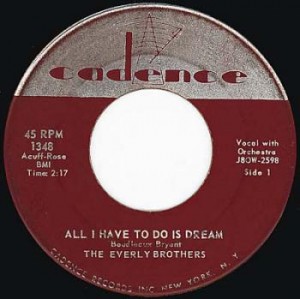
"All I Have to Do Is Dream" is a song made famous by the Everly Brothers, written by Boudleaux Bryant of the husband-and-wife songwriting team Felice and Boudleaux Bryant, and published in 1958. The song is ranked No. 141 on the Rolling Stone magazine's list of The 500 Greatest Songs of All Time. The song is in AABA form.
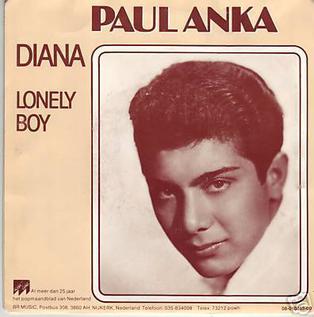
"Lonely Boy" is a song written and recorded by Paul Anka. Recorded in August 1958 with Don Costa's orchestra in New York, "Lonely Boy" was not released until May 11, 1959. Anka sang this song in the film Girls Town. When released as a single, it topped the Billboard Hot 100 for four weeks, becoming Anka's first song to do so, although he had earlier topped Billboard's Best Sellers in Stores chart with "Diana". Billboard ranked it as No. 5 for 1959. The song reached No. 2 in the Canadian CHUM Charts.

"Why" is a hit song recorded by Frankie Avalon in 1959 that went to No. 1 on the U.S. Billboard Hot 100 chart published on the week of December 28, 1959, for the week ending of January 2, 1960, making it the last No. 1 single of the 1950s, and the first No. 1 single of the 1960s at the same time. It also became the first No. 1 single of the 1960s on the Cashbox magazine charts. The song was written by Avalon's manager and record producer Robert "Bob" Marcucci and Peter De Angelis. It was Avalon's second and final No. 1 hit.
"Young Love" is a popular song, written by Ric Cartey and Carole Joyner, and published in 1956. The original version was recorded by Ric Cartey with the Jiva-Tones on November 24, 1956. It was released in 1956 by Stars Records as catalog number 539 and one month later by RCA Records as catalog number 47-6751. Cartey's version never charted.

"Go Away Little Girl" is a popular song written by Gerry Goffin and Carole King. It was first recorded by Bobby Vee for Liberty Records on March 28, 1962. The lyrics consist of a young man asking a young attractive woman to stay away from him, so that he will not be tempted to betray his steady girlfriend by kissing her. The song is notable for making the American Top 20 three times: for Steve Lawrence in 1963, for The Happenings in 1966, and for Donny Osmond in 1971. It is also the first song, and one of only nine, to reach US number 1 by two different artists.
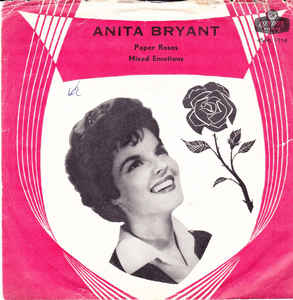
"Paper Roses" is a popular song written and composed by Fred Spielman and Janice Torre. It first was a top five hit in 1960 for Anita Bryant. Marie Osmond recorded it in 1973 and took her version to number one on the US country chart.
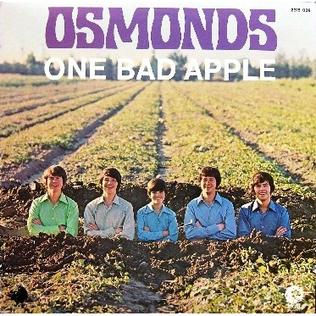
"One Bad Apple" was a No. 1 hit single released by The Osmonds on November 14, 1970. It debuted on the Billboard Hot 100 on January 2, 1971. It hit the top of the chart on February 13, 1971 and stayed there for five weeks. It also reached No. 6 on the R&B chart. Billboard ranked it as the No. 4 song for 1971. Both "One Bad Apple" and the Donny Osmond-credited single "Sweet and Innocent" are on the 1970 album Osmonds. It was certified Gold by the RIAA on February 4, 1971.

"C'mon Marianne" is a song composed by L. Russell Brown and Raymond Bloodworth and popularized by The Four Seasons in 1967. Produced by Bob Crewe, the single was the last Four Seasons single to reach the Top Ten of the Billboard Hot 100 chart in the 1960s, and their last Top Ten hit until "Who Loves You" in 1975.
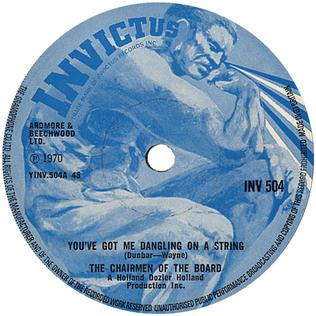
"(You've Got Me) Dangling on a String" is a 1970 soul music song by the Chairmen of the Board. The single reached No. 38 on the US Billboard Hot 100, No. 19 on the US Billboard R&B chart, and No. 5 on the UK Singles Chart. The song was written by Ronald Dunbar and Edythe Wayne.

"Hey Girl" is a song written and composed by Gerry Goffin and Carole King. It first became a popular Top ten hit on the Billboard Hot 100 in August 1963 when recorded by Freddie Scott. Donny Osmond took the song back to the Billboard top ten chart with his cover in 1971.
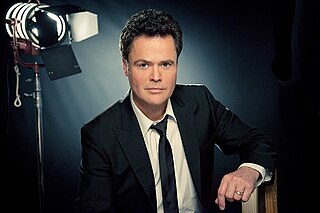
The discography of American pop singer Donny Osmond contains 18 studio albums, nine compilation albums, one live album, four video albums, three extended plays, four music videos, 25 singles and eight additional appearances. After several years collaborating with his siblings' band, The Osmonds, he embarked on a solo career in 1971. His debut single, "Sweet and Innocent," reached number seven on the Billboard Hot 100 and made him a teen pop star. Its follow-up entitled "Go Away Little Girl" topped the same chart in 1971. Also in 1971 his debut studio album was released called The Donny Osmond Album. It peaked at number 13 on the Billboard 200 all-genre chart. His third studio release, Portrait of Donny, reached number six on the Billboard 200 and is his highest-charting album to date. Its two singles became top ten hits on the pop chart: "Hey Girl" and "Puppy Love." He released his fourth studio effort in 1972, Too Young. The record peaked at number 11 on the Billboard 200. It spawned the top 20 pop hits: the title track and "Why." In 1973, Alone Together marked his fifth studio album release and peaked at number 26 in the United States. It spawned his cover of "The Twelfth of Never," which reached number eight on the Hot 100. By the mid 1970s, Osmond reached adulthood adulthood and his career began to decline despite collaborations with his sister, Marie Osmond. In 1976, he recorded an album of disco, which only reached number 145 on the Billboard 200.

"A Million to One" is a song written by Phil Medley and first recorded by Jimmy Charles and the Revellettes.
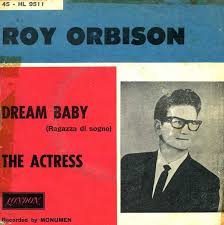
"Dream Baby " is a song written by Cindy Walker which was first recorded and released by Roy Orbison originally as a non-album single in 1962. It was a big international hit for Orbison, reaching number 2 in both the Australian and the UK singles charts and number 4 in the U.S. Billboard. It was also a top ten hit in Canada and Norway. Five months later, "Dream Baby" was included on Orbison's Greatest Hits compilation LP.

"Never Ending Song of Love" is a song written by Delaney Bramlett, and, according to some sources, by his wife Bonnie Bramlett. It was originally recorded with their band, Delaney & Bonnie & Friends, in 1971 on the album Motel Shot. Released as a single by Atco Records the same year, "Never Ending Song of Love" became Delaney & Bonnie's greatest hit on the pop charts, reaching a peak of No. 13 on the Billboard Hot 100 and No. 8 on Easy Listening. It reached No. 16 in Australia.

"Let Me In" is a song written by Alan Osmond, Merrill Osmond, and Wayne Osmond and performed by The Osmonds. It was featured on their 1973 album, The Plan. The song was produced by Alan Osmond.

"Sweet Life" is a song written, composed, and recorded by American singer-songwriter Paul Davis. It was the third single he released from his 1977 album Singer of Songs: Teller of Tales, and his fourth-highest peaking pop hit, peaking at #17 on the Billboard chart in late 1978. On the Cash Box chart, the song spent three weeks at #15. The song also reached #15 in Canada.

The discography of American pop duo Donny and Marie Osmond contains seven studio albums, four compilation albums, one soundtrack album, one live album and 12 singles. Both siblings had previously had successful solo music careers before first collaborating in 1974; Donny was also a member of his brothers' band, The Osmonds. Their first single, "I'm Leaving It Up to You," reached number four on the Billboard Hot 100. Their corresponding debut album of the same name peaked at number 35 on the Billboard 200 chart in November 1974. The release certified gold in the United States for sales beyond 500,000 copies. Together, the duo had two more hits that reached both the top ten and 20 of the Hot 100: "Deep Purple" and "Morning Side of the Mountain."

















